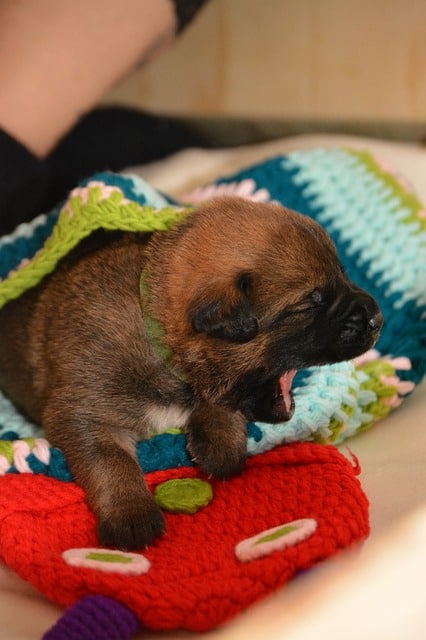You have decided to get a puppy, which is a wonderful idea! Dogs can change our lives for the better, and although puppyhood can be a challenge, this change can be both splendid and heartwarming.
Canines enrich our lives and give us companionship that is always there for us with their comfort and love, no matter the situation.
Most often, with our family members, the later we get home, the more annoyed they become with us.
Not so with our faithful furry friends! The later we arrive, the greater their happiness and excitement to see us!
Belgian shepherd puppies are adorably cute, all four breeds, the Groenendael, Laekenois, Malinois, and Tervuren.
The shepherd puppies I will be referring to with information in this post will be the Belgian Groenendael, also known as the Belgian sheepdog.
A Belgian shepherd puppy growth chart will be included as well as information about Belgian shepherd puppy feeding.

For your dog’s vitamin supplement, foods, toys, or other dogs product please visit the Health Extension website.
Preparing For Your Belgian Shepherd Puppy the Groenendael
Before rushing out to claim your shepherd puppy, or any puppy, for that matter, there are many things to consider. Owning a canine is a big responsibility and not one to be taken lightly.
Puppies especially are very time-consuming and although your Groenendael will not be a puppy for very long, this is the most important time of their lives that sets the stage for their overall demeanor and personality as an adult dog. Below are a few considerations before jumping in.
- Do you have time for a puppy?
Thinking about your family life, work life, and daily schedule, is there enough time to devote to raising a puppy?
Which breed is right for you?
You may just love the look of some breeds, but if they are active dogs, requiring much exercise and you are more of a sedentary person, this may not be a good fit. Grooming is also time-consuming if you choose a high-maintenance breed.
If your heart is set on a Belgian sheepdog, do research, and learn their traits, temperament, and the requirements for raising one.
Breeder or Rescue?
When choosing your puppy, choose a reputable breeder and one that tests their breeding dogs for genetic, inherited diseases. This will give you the best odds at acquiring a Groenendael that is healthy
Rescue or shelter dogs can be wonderful life-long companions, but often, no background information is available along with any hereditary health issues. This will take some thought and perhaps spending time with a puppy you are drawn to.
NEVER get your puppy from a pet store. No matter how adorable they may be, these dogs often come from puppy mills and generally do have underlying health conditions as well as behavioral issues. You will also be charged an exorbitant price, sadly, for an unhealthy puppy.
Prepare your home for a puppy.
Being prepared, like the Boy Scouts, is half the battle in raising a puppy. Puppy-proofing your home is the first course of action by removing anything that could be dangerous to the puppy or anything you value.
If chewed, these items can cause injury or even death, plus anything of sentimental value could be ruined or broken. Hide power chords. Trash should be in a secure cupboard or closet.
Dogs have superpower noses and don’t think twice about devouring stinky trash that can make them sick. To them, it’s just a giant buffet!
The puppy should have their own special area, especially in the beginning, whether it be a crate, corner, or room. They should not have a full run of the house, especially unsupervised. Use baby gates in areas that are off-limits.
Puppy supplies
Before you bring your sheepdog puppy home, make sure you have all the necessary supplies. Some suggestions are:
- A crate
- Blanket
- Toys
- Water and food bowls
- Food
- Leash
- Collar
- Poop bags (Very important for walks and maintaining a good relationship with neighbors!)
Don’t go crazy with the toys until you see what your puppy is attracted to.
Establish a routine
Most people like a routine and dogs do as well. Everyone has a better, less hectic day when they know exactly what’s going on and when. You’ll be surprised how quickly your Groenendael falls into a routine anticipating your next move.
Choose a veterinarian
Have a veterinarian lined up before bringing your new puppy home and preferably with their first appointment for a check and vaccinations. Ask around and get some good referrals from friends, family, or neighbors.
Look ahead to training
Read books on obedience training and even potty training or check out websites or articles online. Ask around to see what friends and family have used for training their dogs. They may be able to turn you on to puppy classes or a trainer.
Belgian Shepherd Puppy Growth Chart
Your Belgian Groenendael will grow into a medium-sized dog weighing from 45lbs to 75lbs and having a height of 22 inches to 26 inches.
They will be considered full-grown at around sixteen months. Of course, your puppy will not start out full-grown and at birth will weigh a little over 1lb.
Below is a puppy chart with an average weight for both males and females, with lower numbers representing females.
| Puppies age | Puppies weight by pond lb | Puppies weight by kilograms kg |
| 3 months | 17.6lbs – 25lbs | 7.98 kg -11.34 kg |
| 4 months | 23lbs – 33lbs | 10.43 kg – 14.97 kg |
| 5 months | 28.6lbs – 40.7lbs | 12.97 kg -18 .46 kg |
| 6 months | 33lbs – 46.2lbs | 14.97 kg – 20.96 kg |
| 7 months | 35lbs – 51lbs | 15.88 kg -23.13 kg |
| 8 months | 36lbs – 56lbs | 16.32 kg -25.40 kg |
| 9 months | 37lbs – 59.5lbs | 16.78 kg – 26.99 kg |
| 10 month | 39.6lbs – 61.7lbs | 17.97 kg – 27.99 kg |
| 11 months | 41lbs – 62.8lbs | 18.60 kg -28.49 kg |
| 12 months | 41.8lbs – 63.9lbs | 18.96 kg- 28.98 kg |
| 13 months | 42.9lbs – 66lbs | 19.46 kg – 29.94 kg |
| 14 months | 43.5lbs – 69lbs | 19.73 kg -31.30 kg |
| 15 months | 44lbs – 72.7lbs | 19.99 kg – 32.98 kg |
| 16 months | 45lbs – 75lbs | 20.41kg – 34.02 kg |
You will see that puppies grow quickly and steadily at first, up until about 9 months, and then gradually taper off to their adult weight.
To check your Belgian shepherd puppy’s health status or DNA, please visit the Embark vet website for all the help you may need.

Belgian Shepherd Puppy Feeding
Your Belgian Groenendael needs adequate nutrition from day one for proper growth and good health.
You can continue feeding your pup the brand of food your breeder used as long as it contains high-quality, healthy ingredients and if your sheepdog is thriving.
If they seem at all underweight or overweight, discussing foods with your veterinarian would be the best course to take.
The food you choose for your Belgian should be a natural, grain-free food that does not contain added sweeteners, artificial preservatives, colors, flavors, or chemicals, especially those you cannot pronounce.
High-quality, less filler ingredient foods are easier to digest, so gas and diarrhea or tummy upset do not become the norm. Food should also contain calcium and glucosamine that make for strong teeth, joints, and bones
Choosing the right dog food wisely, regardless of cost, is the best investment you can make for your puppy’s health.
This important decision can affect your Groenedael’s organs, immune system, and overall health and lengthen their life. This food can also affect their skin and coat, which are a good indication of health.
Hydrated skin and a long, shiny luxurious coat speak volumes about their overall well-being.
The money you invest in their food can save you much more in veterinary bills later in life.
There is a multitude of great kibble puppy and adult foods out there to choose from and kibble is generally the food of choice.
Canned food is available, which can be nutritious, but is soft which allows for minimal chewing action and can add to plaque build-up on teeth, leading to cavities. Canned food can also add extra weight.
Using some canned food along with kibble for some extra flavor now and again is a better method.
You can also feed your Belgian shepherd a homemade diet or raw diet, both of which can be very nutritious and healthy. You can make your own or buy pre-made foods.
This can be quite a bit more costly and research on your part is needed to ensure that your pup is getting all of the important vitamins and minerals required. Supplements may be needed with both diets.
You can also spice up your puppy’s food with healthy fruits and vegetables. These give some added pizazz to their food with the result being a gourmet meal plus extra vitamins! Check it out with your veterinarian beforehand.
Do keep in mind that these fruits and vegetables are an added addition or can be used as treats, but as the saying goes, “too much of a good thing,” may not go over well.
Don’t overdo or your pup can get an upset tummy, diarrhea, or gas. Some acceptable additions are listed below.

Vegetables
- Celery
- Carrots
- Peas
- Green beans
- Cucumbers
- Brussel sprouts
- Spinach
- Broccoli
Fruits
- Oranges
- Mango
- Strawberries
- Bananas
- Apples
- Peaches
- Blueberries
- Pumpkin
- Cantaloupe
- Watermelon
- Pineapple
Fruits and veggies to never feed your sheepdog (can be toxic)
- Onions
- Garlic
- avocado
- Tomatoes
- Asparagus
- Mushrooms
- Raisins
- Grapes
- Cherries
When feeding your puppy, follow the guidelines on the bag for portions. These generally go by age and weight.
| Puppies ages | Times par a day |
| Puppies 8 – 12 weeks | Feed 4 times a day |
| Puppies 3 to 6 months | Feed 3 times a day |
| Puppies 6 months to 1 year | Feed 2 times a day |
Dog over 1 yearFeed 1X a day (daily amount can be split into 2 meals if preferred. Digestion with 2 meals is better.)
Don’t give your puppy table food. This is not only bad for their health but sets the tone that this is acceptable. It will be a hard habit to break as an adult dog.
Yes, your Belgian Groenendael puppy may be a handful at first, as are all puppies, but will grow quickly into a gorgeous adult Belgian sheepdog, leaving you wondering where that tiny puppy went!
If at any time you are concerned about their health or growth and development, don’t hesitate to weigh in with your veterinarian.